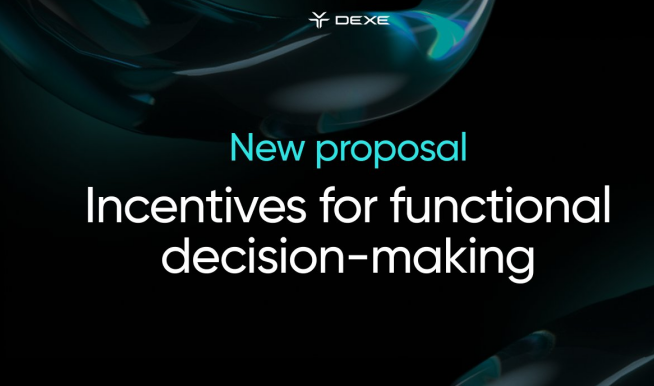The DeXe protocol is the infrastructure for the modularized DAO, with its core token being $DEXE. With the highly anticipated approval of the Bitcoin spot ETF, a large amount of liquidity will enter the Defi track and bring about a new round of on-chain project boom. Any Defi, L2, and other projects all need to undergo DAO governance to complete proposals.

Before this, the design of incentive models has always been targeted at the Defi economic model itself. However, the new proposal from DeXe, as an incentive model built on the DAO core, will reshape the death spiral of Defi through the DAO model in the future, bringing more advanced and valuable incentive models to the Defi track.
What is the new proposal for DeXe?
Due to the active participation of DAO members in various activities, a significant amount of time and effort is required, including reviewing and creating proposals, analyzing arguments, and advocating their views. In addition to these efforts, they also pay gas fees for voting, creating, and executing proposals. In this way, the dedication, active participation, time, and effort of the members are neither refunded nor rewarded, leading to an imbalance in motivation.
Balanced rewards paid from the treasury, in DEXE for on-chain governance activities, can not only compensate for time, effort, and gas fees, but also promote deeper participation and attract competitive experts to join our community, giving them the motivation to spend time making decisions.
Incentives are also considered a means to improve the efficiency of DeXe protocol DAO governance and community participation.
New proposal and incentive rules:
As designed, rewards apply to the following options:
Rewards for creating approved proposals (set quantity of tokens).
Rewards for proposal execution (set quantity of tokens).
Voting rewards (quantity of tokens calculated based on the percentage of voting power shares in the total approved proposal votes).
Rewards for creating proposals
Rewarding the creation of proposals may be unnecessary, as individuals proposing actions for the DAO typically include their interests in the funding request of the proposal itself. However, different perspectives may be valuable. These should be discussed in the comments section to help determine the most effective solution.
Rewards for proposal execution
The gas fees for proposal execution are small and can be refunded in DEXE tokens. The execution gas fee for each proposal is specific, but generally averages between 0.0005 and 0.0015 BNB per transaction, equivalent to 0.2-0.5 USD at the actual market price. I suggest allocating 1 DEXE (actual market price is 3.9 USD) as a refund for the execution fee, which will fully compensate for the gas fee and provide additional rewards, encouraging people to pay more attention to the proposal phase and be more proactive in execution.
Rewards for participating in voting
This is the most crucial factor, as it encourages people to participate in voting and decision-making. In this case, rewards will only be distributed to those who support the vote and only for proposals passed on-chain. This approach minimizes manipulation and improper reward distribution associated with hollow or false proposals. Only feasible ideas that are executed on-chain will earn rewards for voting participants.
Voting rewards are determined based on the total token amount participating in the vote and are distributed based on the proportion of individual DAO members' voting power to the total "support" voting power in the given proposal. In DeXe's non-linear elitist voting system, voting power is derived from various parameters, not just token quantity.
When designing reward calculations, it is recommended to refer to the annual percentage rate (APR) of tokens that the treasury can issue. This APR calculation should take into account the motivation of DAO members and the sustainable issuance of tokens, as the rewards are intended to be distributed in DEXE from the DAO treasury.
For example, if the reward rate is 0.2%, the reward will be calculated as 0.2% of all tokens voting "support" in the approved proposals. Assuming the DAO passes 50 proposals per year, this would be equivalent to a 10% APR (50*0.2=10%).
Currently, the proposal considers three ranges for voting rewards:
Medium ~10% APR (reward rate - 0.2%)
High ~25% APR (reward rate - 0.5%)
Special ~50% APR (reward rate - 1%)
It is worth noting that:
The DeXe protocol DAO is in an active configuration stage; the number of proposals accepted next year is likely to exceed 50.
The larger the percentage, the more funds will be withdrawn from the treasury, subsequently having a greater impact on the price of governance tokens.
The DAO treasury of the DeXe protocol is still in the process of being transferred to the protocol's smart contract, but rewards will be calculated from the time of activation, and can only be claimed after the treasury is transferred to the DAO smart contract.
How will the new proposal from DeXe innovate the Defi track?

Direct impact on the token model of Defi
The new proposal from DeXe DAO, aimed at implementing a structured reward system for governance participation, may significantly impact the Defi economic model. The Defi economic model mainly involves aspects such as lending, liquidity provision, trading, and asset management, with its core design goal being to encourage user participation through incentives such as interest, rewards, and returns.
This proposal, by providing tangible rewards for participation in governance and decision-making processes, is consistent with various models observed in Defi. For example, the governance model represented by Uniswap emphasizes the role of token holders in protocol governance, where the utility of tokens is mainly related to decision-making power. This proposal can enhance such models by providing specific rewards for governance behavior, thereby increasing stakeholder participation.
In addition, the proposal adopts the concept of Value Flow, aiming to understand and optimize the flow of value within the protocol. This includes considering actual revenue, income redistribution paths, incentive links, and token flow, all of which are critical to the sustainability and success of Defi projects.
In particular, the idea proposed in the proposal to reward users based on voting power is similar to the VE (voting escrow) model, where users lock tokens to obtain governance tokens, with longer lock-up periods resulting in more voting power and rewards. This not only incentivizes long-term holding but also aligns the user's interests with their contributions to governance.
The design of the proposal also reflects elements of the ES (emission schedule) model, aiming to reduce subsidy costs by implementing thresholds for reward unlocking. This model promotes the distribution of real profits and is more inclusive, potentially attracting more users to participate in the ecosystem.
Furthermore, the proposal's structured incentives for liquidity providers (LPs) to participate more deeply and for a longer period enhance the overall activity and attractiveness of the protocol. This design may drive the operation of "flywheel" operations in Defi projects, where profit redistribution requires LPs to commit tokens to maintain liquidity provision.
The incentive system proposed by DeXe DAO's proposal may reshape the Defi economic model by integrating core elements such as fundamental value, token supply, demand, and utility in a more structured and beneficial way. This integration, facilitated by the design of the proposal, may lead to a more robust and participatory Defi ecosystem.
Can be combined with Defi liquidity mining
Defi liquidity mining, also known as yield farming, is a key component of the Defi ecosystem. It involves cryptocurrency holders providing liquidity to decentralized exchanges (DEXs) and lending protocols, facilitating smooth operation of trading, borrowing, and lending operations. In return, liquidity providers receive LP tokens representing their share in the liquidity pool, which can be used in Defi protocols to earn rewards.
The new proposal, by providing structured rewards for governance participation, complements this existing framework, adding an additional layer of incentive for active participation. Rewards for liquidity mining typically appear in the form of additional tokens, interest, or a share of platform fees. These incentives attract users to lock their assets in liquidity pools, making them an integral part of the Defi infrastructure. Additionally, liquidity mining often complements community governance, allowing participants (including liquidity providers) to express their opinions through voting rights on protocol upgrades, fee adjustments, or new features.
The combination of the new proposal with liquidity mining can deepen user participation in the DeFi ecosystem. By providing rewards for governance activities, the proposal encourages more active and democratic participation in the decision-making process. This consistent incentive can enhance the sustainability and success of DeFi projects, promoting a more vibrant and participatory community. Additionally, by rewarding users for their governance behavior, the proposal can incentivize token holders to retain their holdings, thereby contributing to the stability and growth of the DeFi ecosystem. The synergistic relationship between liquidity mining and governance incentives can create a stronger and more dynamic DeFi environment, benefiting all participants.
The Wealth Effect of the New Incentive Model
Firstly, these proposals can increase the value of governance tokens by incentivizing participation in governance and providing liquidity, benefiting token holders. Active governance participation ensures that decisions are in the best interest of the ecosystem, potentially leading to better performance and higher token valuation.
Rewarding participants for executing proposals with DEXE tokens not only compensates for their gas fees during execution but also stimulates more users to actively participate in DeXe DAO governance. This economic incentive can attract more users to strengthen the entire DeXe ecosystem.
Furthermore, the increased participation of active users will enhance the utility of DEXE tokens, attracting more users to hold DEXE and driving its value growth. The innovation of the incentive model can enhance the core utility of DEXE tokens, attracting more users to join the DeXe ecosystem. The growth of the user base, resulting in a positive cycle such as an increase in locked-in volume and trading volume, will continuously strengthen the value of DEXE.
Secondly, effectively managing and distributing rewards can attract more users and capital to the platform. This increased participation can enhance the liquidity and health of the entire DeFi ecosystem, creating a stronger market and leading to rapid capital appreciation.
Thirdly, by providing structured rewards for various activities, such proposals can generate additional income for participants. This includes not only direct financial rewards but also potential capital gains from the appreciation of underlying assets and tokens.
In summary, the new proposal from DeXe represents an innovation in the incentive model for DAO organizations, representing that Defi will not be limited to liquidity mining protocols and simple community voting governance. A richer governance model and incentive model will be built on the Defi track, and a more decentralized operation and incentive model will also drive the rapid increase in the price of DEXE tokens, bringing about the wealth effect of other tracks in the bull market. Currently, DEXE has been listed on Binance, and its price trend needs to be closely monitored before the end of its proposal.
免责声明:本文章仅代表作者个人观点,不代表本平台的立场和观点。本文章仅供信息分享,不构成对任何人的任何投资建议。用户与作者之间的任何争议,与本平台无关。如网页中刊载的文章或图片涉及侵权,请提供相关的权利证明和身份证明发送邮件到support@aicoin.com,本平台相关工作人员将会进行核查。




